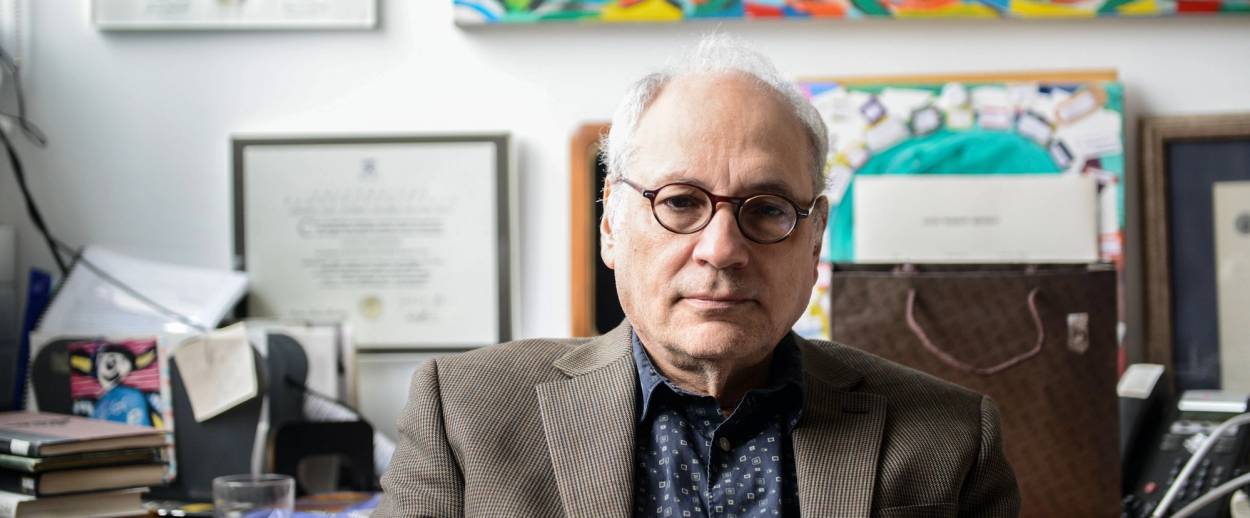A Jellyfish With a Jew’s Ear, for the Millions
Avant-garde trickmaster Charles Bernstein’s mass appeal is evident in his new collection of essays, ‘Pitch of Poetry’




A young poet opens his Facebook feed and it’s been taken over by pictures of the budget-friendly chef Rachael Ray. What’s more, all of the young poet’s obscure poet-friends are liking the pictures. But the joke, as always, is on the young poet who could not fathom how he and Ray could possibly share a taste in poetry: Rachael Ray and her husband renewed their vows outside of an Italian castle, and as part of the ceremony Ray did read a poem by the avant-garde poet-trickster, theorist, philosopher, professor, and literary critic Charles Bernstein.
Avant-garde poets are supposed to be difficult and incomprehensible, forgotten and miserable. The density of discourse around Bernstein’s work, combined with the impressive number of domestic and international awards and distinctions he’s received in recent years, continues to baffle and inspire. The new collection of Bernstein’s essays Pitch of Poetry finally offers some insight into the seeming paradox of his mass appeal: For all of its classic avant-garde tropes—complexity, insider references, and elitism—the collection is also irresistibly entertaining, chatty, and thought-provoking—philosophically, politically, and technologically.
In the late 1970s, Charles Bernstein, along with poet Bruce Andrews, launched L=A=N=G=U=A=G=E, a now-legendary literary journal. The journal’s name became both the signpost for a new literary community and a loosely defined set of poetic affinities shared by that community’s members. In an overview of the key tendencies associated with Language poetry, Bernstein points to the “new approach to the essay, averting exposition in favor of wild combinations, shifts of mood and tone, hyperbole, enigma, lyric exuberance, rhythmic propulsion, telegraphic immediacy, digression, aphorism, contradiction, investigation, and dialogue.”
One of the premises shared by L=A=N=G=U=A=G=E poets is the idea that language is not only a means of communicating an experience—it is actually an experience in and of itself. In the right state of attention, one’s awareness of the experiential nature of word-music, word-bending, vernaculars, noise, gibberish, and polyphony is already a solid premise for a poetic experience. Indeed, when Bernstein proclaims, in an earlier collection, “I am a Jewish man trapped/ in the body of a Jewish man,” one gets a sense of poetic discourse as a closet that can never be exited and at the same time hear the big laugh that resonates from over there. One might even think of the more colloquial, less refined meaning of the word “trap”—pointing to the poet’s main, or only, instrument.
Humor is crucial to Bernstein’s poetics. In “In Unum Pluribus,” an essay included in Pitch of Poetry, the poet delights in the bilingual signs he encounters while touring China—“a sign in a hotel elevator touches on the magnificent impossibility of literal translation: a food dish labeled ‘Jellyfish with Jew’s-Ear’—something I would like to use as the title of a poem, I like it so very much.” To this exotic dish, Bernstein lends his very own “Jew’s-Ear”: listening to the untranslatable.
If there’s a common strand running through many of the poets Bernstein examines in the collection—Stein, Paul Celan, Jackson Mac Low, Louis Zukofsky, Hanna Weiner, and others—it’s that they’re all objectively difficult to read. All are engaged in profound experiments with writing, the invention of new poetic forms, and even proposals of alternative ways of thinking about and using language. Interspersing keen literary analysis with humor is helpful—in part because these poets themselves had an affinity for irony that Bernstein brings to light. Moreover: Breaking your teeth over these poets’ work, or baring the teeth in a smirk—which would you rather?
Then again, is there not a downside to irony as the constitutive element of the poetic experience? This line: “For me, poetry is a form of sophism and of rhetoric rather than of truth and sincerity.” If this statement is sincere—and one can never be sure—then it is also somewhat disheartening, because such an attitude downplays poetry’s power to address the fundamental questions of existence: meaning of life and/or the lack thereof, mystery/misery, yearning, infinity, and spiritual experiences. There’s no doubt that these themes can be discussed in the context of Bernstein’s work, but the explicit address of them is nearly absent. Is it a philosophical stance or the avoidance of a stance—or both? Or is it that the poet favors implicit encounters? Is it that this is simply not his bag—or a bag that he’s leaving to others to hold?
What is undoubtedly sacred for Bernstein, and is inseparable from both his poetry and criticism, is the sense of a poetic community. Nearly a third of the collection is written in collaboration with others. Instead of traditional interviews, Bernstein engages in dialogues: Poets are notorious for unending Q&A soliloquies, prompted by the briefest of questions, and he subverts that norm by talking with, and even thinking together with his interlocutors. In one such memorable interview, poet and scholar Stephen Ross compares Bernstein’s poems to “midrashim, or Jewish parables, gone awry,” and asks Bernstein about his relationship with his Jewishness. It is Ross’ insightfulness that elicits the following tirade: “I am chosen more than choosing. And that goes pretty far, just not all the way. That is, I am interested in Jewishness as a specific response to the condition of being Jewish (the circular reasoning is liberating)—and as an argument with that condition. Like other identities, Jewishness is a product of Jewish culture, it’s imbibed, a contact high, a mass hallucination, as real as a belly flop from the 12-foot diving board at the Fontainebleau Hotel, Miami, circa 1962. Nothing more real than that; that is no other form for being a Jew is any more real or authentic or legitimate, if I say so. I am the happy genius of my own identity (to echo Williams, lonely, dancing naked in Dance Russe, proclaiming, ‘I am the happy genius of my household.’)”
It is a witty and delightful rant that doesn’t merely talk about Jewishness—but performs it. And if the hearty post-identity perspective Bernstein offers here is not exactly new, or even cutting-edge, it is notable that he drags William Carlos Williams into a 21st-century discussion of Jewish identity. All the essays in this volume share this sense of a playing field where, at the drop of a hat, any writer, poet, painter, philosopher, and thinker can be summoned and given a generous, often unexpected, context. In that way, the interconnectedness of Bernstein’s writing is less reminiscent of writing—in the bookish sense—as it sprawls, reaches out, and hyperventilates in a way that’s reminiscent of the Internet, where indeed many of the essays included here first appeared. This engagement with technology—as not merely a tool, but a frame for thinking and writing—is perhaps another dimension that makes Bernstein both avant-garde and accessible. A significant portion of the footnotes point to web locations, rather than books, and that gives the work a sense of immediacy. For a better or worse, only a few people, prompted by a footnote, will start digging for that one precious line in a Dickinson folio; anyone can type in a hyperlink and take a look.
However cerebral and complex, Bernstein has done a great deal to move poetry toward greater accessibility. PennSound, a mammoth collection of audio and video recordings of poetry, old and new, is a major project that Bernstein co-founded with his Penn colleague, the charismatic scholar and advocate for the encounter of Humanities and technology Al Filreis. Here lovers of Robert Frost can hear rare audio recordings of the poet’s readings; more adventurous folks can learn all about a recent experimental poetry movement Flarf, listen to Bernstein’s poetry and poetics—or even chance upon the work of another, deserving if obscure poet. While previously, this material would be available to those willing to dig through dusty university archives or chase collectors, all one needs to do now is tune in while driving to work, or say, cooking your staple barbecued Chinese chicken lettuce wraps for dinner.
Which brings us back to Rachael Ray. To be fair, the poem Ray recited in Italy was, at least on the surface, one of Bernstein’s most accessible. There’s nothing there that might ruin the appetite of guests or leave a sardonic aftertaste as the vows were being exchanged: “Not for all the whiskey in heaven/ Not for all the flies in Vermont/ Not for all the tears in the basement/ Not for a million trips to Mars … No, never, I’ll never stop loving you.”And yet, for the emotional complexity inherent in this particular work, one only needs to watch this video of the poet in performance: It is an invocation, breakthrough language, and above all, yes, a vow.
***
To read more Tablet magazine writing about poetry, click here.
Jake Marmer is Tablet’s poetry critic. He is the author of Cosmic Diaspora (2020), The Neighbor Out of Sound (2018) and Jazz Talmud (2012). He has also released two jazz-klezmer-poetry records: Purple Tentacles of Thought and Desire (2020, with Cosmic Diaspora Trio), and Hermeneutic Stomp (2013).